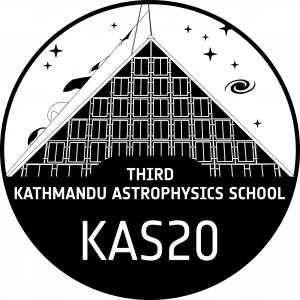Home page
The Kathmandu Astrophysics School (KAS) aims at mentoring and upskilling advanced undergraduate and beginning graduate students, selected through an open, equitable and competitive application process, in both professional and academic areas through engagement with a highly-qualified international faculty. The program is organized approximately every two years with a mix of remote and in-person learning, and open to applicants from every country although the primary target is to reach Nepali students. KAS is supported by the International Astronomical Union Office of Astronomy from Development and by the Laby Family Foundation.
Currently the third Kathmandu Astrophysics School (KAS20) on “Introduction to astronomical observations and data analysis” is open, with a two-phase approach: a first part online followed by a two-week residential program later in 2021. Applications are accepted until 11 October 2020.
The third Kathmandu Astrophysics School on “Introduction to astronomical observations and data analysis” (KAS20)
Data analysis and visualization techniques play a fundamental role in all fields of astrophysical research, especially with larger and larger observational datasets becoming available thanks to current and future ground and space telescopes.
Students of the third Kathmandu Astrophysics School will be introduced to basic concepts on problem solving and data analysis utilized in a variety of astrophysics and cosmology contexts from high-energy to radio observations. Lectures will be combined with hands-on projects, professional development and networking, with the goal of mentoring advanced undergraduate and beginning graduate students to improve their research and presentation skills.
The school will be held in two parts: The first component will be an online program covering at the introductory level astrophysical coding in Python, key concepts and techniques used in observational astrophysics, professional development and teaching skills. Approximately 50 students will be selected.
The second component will be a two-week full-time in-person program held in tranquil Pokhara (Nepal), at the foothills of the Annapurna range, with student lodging and meals fully covered thanks to the support of the IAU Office of Astronomy for Development. Students will focus primarily on group research projects under the guidance of the KAS faculty, as well as on more advanced professional development. Approximately 25 students will be invited to Pokhara, selected from the alumni of the first part of the school (with travel grants available).
WHEN?
The first (online) component of KAS20 will start on Monday 9 November 2020 with a welcome session, and continue through January 2021 (with a break at the end of December). The program will consist of two one-hour sessions per week, with approximately 4 hours per week of additional time commitment for practical assignments and review of class material.
The second (residential) component of KAS will be scheduled once the COVID-19 pandemic is resolved and international travel is safe, in the second half of 2021 if possible.
WHERE?
Online for the first component; on the Prithvi Narayan Campus, Pokhara (Nepal) for the residential component.
WHO? (Faculty)
Michele Trenti (Co-Chair)
University of Melbourne (Australia)
Clare Kenyon (Co-Chair)
University of Melbourne (Australia)
Mustafa Amin
Rice University (USA)
Rajan Chhetri
Curtin University (Australia)
Jack Line
Curtin University (Australia)
Nora Luetzgendorf
European Space Agency
Manisha Shrestha
Liverpool John Moores University (UK)
WHO? (Additional Organizing Committee Members)
Rojita Buddhacharya, Kathmandu, Nepal
Kul Prasad Dahal, Tribhuvan University, Prithvi Narayan Campus, Nepal
Stefanie Komossa, Max-Planck-Institut fuer Radioastronomie, Bonn, Germany
Eliana Palazzi, INAF – Astronomical Observatory Bologna, Italy
Andrzej Zdziarski, Polish Academy of Sciences, Warsaw, Poland
Previous KAS editions:
KAS18, on Introduction to computational methods in astrophysics. Held in Pokhara on 10-17 June 2018.
KAS16, on Order of magnitude astrophysics. Held in Kathmandu on 24-28 October 2016.
Student’s participation to KAS20 is supported through a grant awarded by the IAU Office of Astronomy for Development. Thus, there is NO REGISTRATION FEE to attend.
For the first part, support will be available if needed to ensure equitable access to online resources.
For students invited to the future residential component, lodging and meals in Pokhara will be provided as well, and there might be some limited opportunities to partially support travel costs.
Application Deadline: 11 October 2020, 5pm GMT
Please access and submit the application form under this link:
https://forms.gle/aREYi1gxpqE9mgFn6
Successful applicants will be selected promptly after the deadline, and early applications are strongly encouraged.
The KAS organizing committee aims to achieve participation by a diverse and international cohort of undergraduate and beginning graduate students, with substantial inclusion of those enrolled at institutions in Nepal. The selection will be based on a combination of (1) academic achievements and excellence relative to opportunity; (2) interest in astrophysics, demonstrably sustained over time; (3) future academic and professional plans; (4) communication skills, including proficiency in English.
Late applications will NOT be considered.
Any Questions? You can reach us at astroschoolnepal@gmail.com







